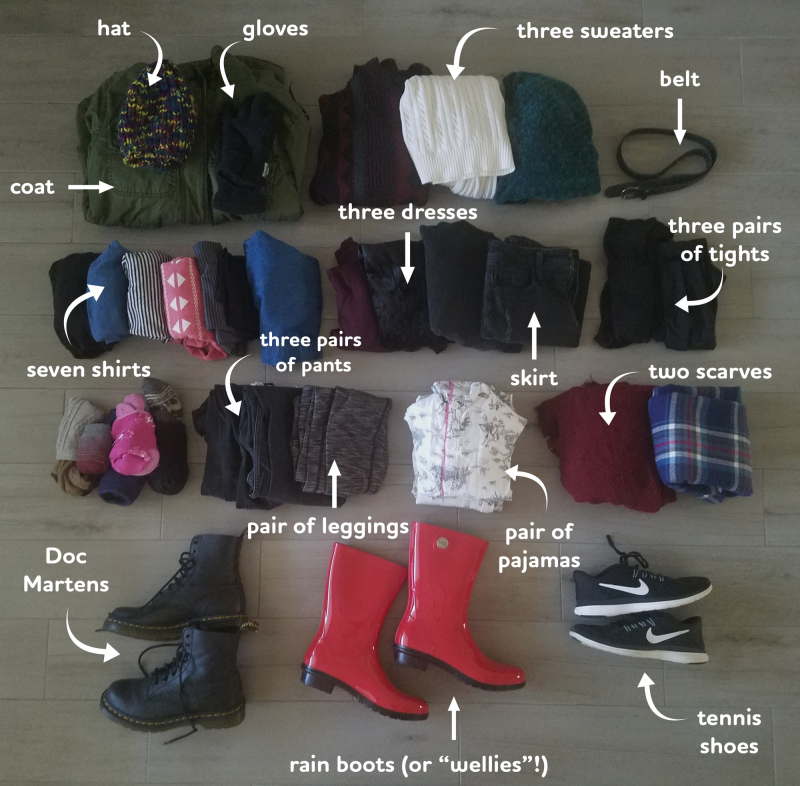I’m leaving for a semester abroad in Scotland this week, and I can only bring one suitcase full of clothing — no more, no less. I’ve lived out of a suitcase before but never for this long. As I prepare for the trip, I’ve found myself staring overwhelmed at the mass of clothing in my closet, wondering which pieces I absolutely have to take and which I won’t need.
I’m realizing I’m not used to minimalism or focusing on necessity over looks when it comes to clothes — I’m used to volume. Collecting more and more shiny new items with little regard for how long they’ll last or the actual amount of joy they’ll bring me.
According to statistics, I’m not alone: We all purchase exorbitant amounts of cheap, trendy clothing that quickly ends up as trash. This is an enormous problem that’s harming garment workers, the environment and ourselves.
Yearly, 80 billion pieces of clothing are purchased worldwide — that’s 400 percent more pieces than were purchased a decade ago. The U.S. alone produced 16 million tons of textile waste in 2015, of which a mere 15.2 percent was recycled.
And if you think donating clothes to Goodwill is the solution, you’re mistaken. Though the average American donates 82 pounds of clothing per year, only 10 percent of donated clothing is actually sold in thrift stores. The rest ends up in landfills.
Perhaps worst of all, most of the clothing we buy is not produced ethically. Andrew Morgan’s 2015 documentary “The True Cost” examines the dangerous lives of garment workers in countries such as Bangladesh, China and Cambodia. Wages are low for these workers, and factory disasters are accepted as part of the cost of doing business. Yet fast fashion companies like Forever 21, Topshop, Zara and H&M have such cheap prices that the only way they can make money is through volume. More and more and more production.
Our excessive consumerism is also unfulfilling on an individual level. Consumerism is an exhausting cycle of getting something new, loving it, forgetting about it a week later and getting another new thing. In a 2017 opinion column, English professor David Rando put it better than I could: “We’ll get a little thrill when that Amazon package arrives, but soon enough, we know, it will be added, like a shiny link, to the long chain of tinsel products that have failed to satisfy.” Construction of this infinite shiny chain is an addiction and a waste of our finite resources — money, time, energy.
Only recently have I become more conscious about where I get my clothes. Everyone who knows me knows of my love affair with second hand clothing store Plato’s Closet — a store where you can buy a cute button-up skirt without directly supporting the fast fashion industry. As for the long term lives of clothing, I will probably be wearing my favorite eighties men’s sweater from Goodwill until the day I die. Most importantly though, I’m trying to just buy less.
As for my minimal semester abroad, here are my goals. Maybe they can become your goals, too, and we can all be a little nicer to this planet together.
I want to repeat outfits many times. I want to love what I’m wearing not because it’s new but because it’s well-made or has a story behind it. I want to completely stop supporting fast fashion companies, but I will also keep in mind that limiting my support of these companies is a step in the right direction.
I don’t want to limit my minimalist philosophy to clothing either. For instance, I’m trying not to stress about visiting every major city in Europe while I’m abroad. I’ll experience all I can within reason, but I’m not going to hate myself if my most valuable moments involve tea with a friend a block away from my flat. I want to focus on cultivating a few quality things — friendships, experiences, T-shirts — that mean a lot to me rather than accumulating as many as possible for the sake of abundance.






